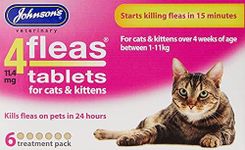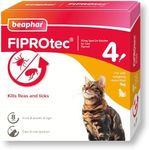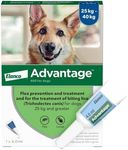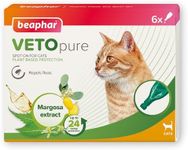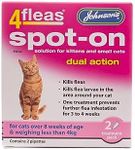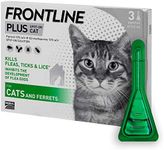Buying Guide for the Best Cat Flea Treatments
Choosing the right cat flea treatment is crucial for maintaining your pet's health and comfort. Fleas can cause discomfort, allergic reactions, and even transmit diseases to your cat. When selecting a flea treatment, consider your cat's lifestyle, age, health condition, and the severity of the flea infestation. It's important to understand the different types of treatments available and how they work to effectively eliminate fleas and prevent future infestations.Type of TreatmentFlea treatments come in various forms, including topical treatments, oral medications, collars, and sprays. Topical treatments are applied directly to your cat's skin and are effective for quick relief. Oral medications are ingested and work from the inside out, often providing longer-lasting protection. Flea collars release active ingredients over time and are convenient for ongoing prevention. Sprays can be used for immediate relief and are often used in conjunction with other treatments. Choose a type based on your cat's tolerance and your preference for application.
Active IngredientsThe active ingredients in flea treatments are what kill and repel fleas. Common ingredients include fipronil, imidacloprid, and selamectin. Each works differently, targeting fleas at various life stages. It's important to choose a treatment with ingredients that are effective against the specific flea problem you are facing. If your cat has had reactions to certain ingredients in the past, consult with a veterinarian to find a suitable alternative.
Duration of EffectivenessThe duration of effectiveness refers to how long the treatment will protect your cat from fleas. Some treatments offer protection for a month, while others can last up to three months. Consider how often you are willing to reapply the treatment and the level of flea exposure your cat has. For cats that spend a lot of time outdoors, longer-lasting treatments might be more convenient.
Age and Weight RestrictionsFlea treatments often have specific age and weight restrictions to ensure safety and effectiveness. It's crucial to choose a product that is appropriate for your cat's age and weight. Kittens and smaller cats may require different formulations than adult or larger cats. Always check the product label and consult with a veterinarian if you are unsure about the suitability for your pet.
Water ResistanceWater resistance is an important factor if your cat is frequently exposed to water, either through baths or outdoor activities. Some treatments maintain their effectiveness even after getting wet, while others may need to be reapplied. If your cat is likely to get wet often, opt for a water-resistant treatment to ensure continuous protection.
Ease of ApplicationEase of application can greatly influence your choice of flea treatment. Some cats are more tolerant of certain application methods than others. Topical treatments and collars are generally easier to apply, while oral medications may require more effort if your cat is picky. Consider your cat's temperament and your own comfort with administering the treatment when making your choice.

